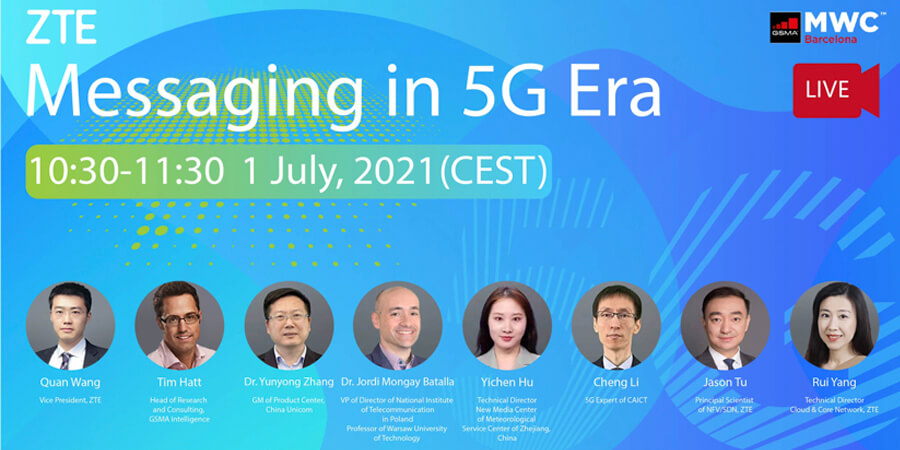On 1 July, ZTE held an online forum titled “Messaging in 5G Era” at MWC Barcelona 2021.
At the forum, experts from global standards organizations, leading operators, service providers and vertical industries discussed the practices and promising future of the 5G Messaging ecosystem.
“5G Messaging has the high potential in a new era of mobile communication. It focuses on business messaging, and provides ubiquitous, efficient, intelligent and secure messaging services for individuals and businesses,” said Wang Quan, Vice President of ZTE Corporation. “It’s a preferred channel for brands to realize high business conversion. Operators can achieve transformation from channel to the entry of service and application distribution. 5G Messaging brings the operators an innovative business model for new revenue.”
“The development of 5G Messaging requires a powerful ecosystem. Currently we are excited to see that the global end-to-end ecosystem is ready. Most of the mainstream terminal manufactures are taking 5G Messaging into consideration, while a lot of vertical industries show great interest in 5G Messaging. The new business model has been verified in some major markets,” added Wang Quan.
With more and more operators joining the ecosystem worldwide, more third-party businesses and brands are getting interested in 5G Messaging, while the number of users is increasing accordingly.
Tim Hatt, Head of Research and Consulting at GSMA Intelligence said, “The coverage of Rich Communication Services (RCS) is around 1.3 billion people. We think that through continued expansion, the number will rise to 3.5 billion people over the next 2 years. By 2023 about 40% of the global mobile subscribers can have access to RCS.”
China has the world’s largest mobile communication market with 1.6 billion mobile connections. Last year, the three major Chinese carriers jointly released a 5G Messaging white paper, and now they have constructed the largest commercial network of 5G Messaging in the world.
“The three carriers are determined to actively explore ecological cooperation and work together for common development. China Unicom is driving innovation with digital transformation, and working with strategic partners to give full play to the advantages of cooperation, expecting to build a 5G messaging ecosystem with the high-quality supply and demand balance, and create a dual cycle of digital economy,” said Zhang Yunyong, GM of Product Center, China Unicom.
To accelerate the development of 5G Messaging ecosystem in China, the 5G Messaging Working Group has been founded, initiated by China Academy of Information and Communications Technology (CAICT) and China Association of Communication Enterprise (CACE).
Li Cheng, Technical Director of CAICT, said, “The 5G Messaging Working Group is composed of different kinds of companies in the 5G messaging ecosystem, including vertical industry companies, mobile network operators, UE and SDK companies, Chatbot service providers, Internet companies and system development companies. Over one hundred companies have joined the working group. It could promote and enrich 5G messaging service scenarios. We hope the working group could be a good start to inspire 5G messaging service innovation for the industry.”
Dr. Jordi Mongay Batalla, VP of Director of National Institute of Telecommunication in Poland and Professor of Warsaw University of Technology, said, “In the next decade, the next generation messaging service in the B2B field in Poland may become the new growth point of digital economy. It is going to provide not only new business, but also new applications which can help to improve citizens’ lives.”
5G Messaging empowers thousands of industries. As a vertical industry representative, Meteorological Service Center of Zhejiang Province has demonstrated typical scenarios of 5G Messaging applications in the meteorological service field.
In the future, 5G Messaging is not only the information service platform to achieve connections between people and people, or people and services, but also to connect between people and things, or things and things, becoming the digital information service infrastructure of the intelligent Internet of things (IoT).
Jason Tu, Principal Scientist of SDN/NFV solution at ZTE said, “5G Messaging will redefine messaging services. ZTE AnyMessaging solution could support all the existing messaging solutions, and users can access the platform from 2G/3G/4G/5G networks. It can support any business messaging format according to the industry standards. It can be deployed flexibly, meeting carriers’ transformation requirements of messaging platforms in the 5G era.”
As a pioneer by promoting 5G Messaging ecosystem, ZTE has powered the world’s largest 5G Messaging platform. For terminals, from the beginning of this year, all 5G smart phones released by ZTE will support 5G Messaging. To help vertical industries, through the Openlab, ZTE works with over 70 CSPs to incubate more than 150 5G Messaging Chatbots.
“ZTE is committed to working with global operators and partners to build a new messaging ecosystem in 5G era,” added Jason Tu.





